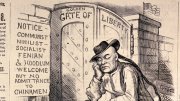In the fall of 2016, writes Michael Luo ’98, “I was standing in the rain with my family and some friends, in front of a restaurant on Manhattan’s Upper East Side,” when a woman brushed past on the sidewalk and shouted back, from down the block, “Go back to China!” After she escalated to an obscenity, Luo recalls, “I said, ‘I was born in this country!’” Thus was planted the seed for his sweeping Strangers in the Land: Exclusion, Belonging, and the Epic Story of the Chinese in America (Doubleday, $35). Amid the current paroxysms concerning immigration, diversity, and race, his history of earlier, often dismaying, confrontations and crises could not be more important. From the introduction, where Luo, now a New Yorker editor, summarizes what happened—beginning in 1848 when the Gold Rush lured Chinese workers to California, yielding a population that was nearly 10 percent Chinese a dozen years later:
This book tells the story of how the United States responded to the influx of tens of thousands of people from a distant land, who spoke a different language, had different beliefs and customs, and did not fit into the country’s existing racial stratification. Americans initially welcomed the Chinese arrivals, but as their numbers grew, the sentiment turned ugly. While the debate over slavery roiled the eastern half of the country, a different kind of racial conflagration broke out on the West Coast. Horrific episodes of racial violence erupted in the minefields; lawmakers passed laws targeting Chinese immigrants; California’s highest court ruled that Chinese testimony was inadmissible in court against a white person. Politicians recognized an opportunity in the rising anti-Chinese sentiment and began calling for their removal. They cast Chinese immigrants as a threat to Anglo-Saxon civilization. They twisted the principle of “free labor,” an ideology that took shape in response to slavery, into a weapon of racial oppression, condemning all Chinese as “coolie” laborers. Crucially, lawmakers decided to bar Chinese immigrants from naturalized citizenship, even as they extended the privilege to “persons of African descent.” A prolonged economic downturn that idled legions of white workingmen helped create the conditions for what came next. Congress enacted a series of laws, each more onerous than the previous, to exclude Chinese immigrants from the country. As shiploads of Chinese people continued to cross the Pacific, their opponents turned to violence, resulting in some of the ugliest episodes of racial terror in our national history. Later, in the twentieth century, after Chinese exclusion became permanent, a sprawling federal bureaucracy took shape to keep them out.…
Yet the Chinese in America persisted. They spread out across the American West…. A population of Chinese Americans even took root in the Mississippi Delta, operating grocery stores that catered to Black customers in the Jim Crow South.…A native-born generation emerged, whose members found themselves caught in the familiar wrenching contest between their parents’ culture and the forces of assimilation and acculturation. Unlike the descendants of Irish, German, and other European immigrants, Chinese Americans carried the additional burden of race.









